The destruction of the Polish army near Pilyavtsy
The situation before the battle
After the defeat of the Polish troops under the Yellow Waters and Korsun, in which the Polish peacetime army was completely killed and both hetmans were captured (corona and field), the uprising of the Russian people began to spread rapidly throughout Little Russia (Ukraine, Western, South-Western Russia). What happened was what the Polish gentry feared most. The real national liberation war of the Russian people against the Polish invaders and their local accomplices began, including the local fledging nobles (of Russian origin, but already Poles in spirit, upbringing and education). The accumulated hatred against masters, oppressors and usurers, who hurt people, has found a way out. Polish gentry and Jews, who did not have time to hide in well-fortified cities and castles, were massacred. Runaway peasants, serfs (a category of bonded population) ran to the Khmelnitsky camp from all sides and enrolled in the Cossacks.
Bogdan Khmelnitsky, having moved from Korsun up the Ros, to Belaya Tserkov, found himself at the head of a large army, which he began to equip and arm with the help of those captured from the Poles weapons and gear. Having taken the title of hetman, the Zaporozhian, Bogdan troops, in addition to the former six regimental regiments (Chigirinsky, Cherkassky, Korsunsky, Kanevsky, Belotserkovsky and Pereyaslavsky), began to form new regiments; appointed his own power of colonels, captains, captains. Following the model of the old regiments, new ones were formed: on the Left Bank - Prilutsky, Mirgorodsky, Nezhinsky, Borcensky, Ichnyansky; on the Right Bank - Kiev, Uman, Vinnitsa. The formation of new regiments with the development of the war continued.
Hence Khmelnitsky also sent its envoys and generalists to Western Russia, urging the Russian people to unite and unanimously rise against their oppressors, the Poles and the Jews (Jews). At the same time, Bogdan did not formally call for a rebellion against the king, who allegedly himself supported the Cossack uprising. Getman was an experienced politician and warrior. He did not trust the temporary allies - the Crimean Tatars, who could at any time throw and change the Cossacks. There was no clarity and the Russian kingdom. Khmelnitsky offered Moscow to take Little Russia into citizenship and provide military assistance against the Commonwealth. But Moscow did not render direct assistance to the uprising, and did not hurry to begin reunification with Little Russia. The Moscow government was afraid of war with the powerful Polish-Lithuanian Commonwealth, and even under unfavorable domestic and foreign policy conditions. So, in Russia at that time a wave of uprisings and riots took place, including the famous Salt Riot. Therefore, the Moscow authorities were wary of a large-scale war of the Cossacks, burghers and peasants against the Polish authorities. On the other hand, Russia has not yet healed the wounds of the terrible Troubles of the beginning of the century, and has not forgotten the unsuccessful Smolensk war of 1632 - 1634, in order to get involved in a new war. In addition, Russia and Poland were allies against the Crimean Khanate, and Khmelnitsky used the Tatars against the Poles. Therefore, there was no hope for the Russian army. However, Moscow closely watched the events and gradually began to lean toward the rebels. So, the Russian government decided to abandon the implementation of the military treaty with Poland. Despite the urgent requests of the Polish authorities to send Russian troops to Ukraine in order to crush the “rebels,” they were denied this. The Russian government advised the Polish that it did not keep the war and did not spill the blood of the Christian with the “army of Zaporizhia”, and offered to satisfy the demands of the rebels. The Russians also provided food aid to the regions of Little Russia affected by crop failure and war. There was also indirect help in other forms. So, with the beginning of the war of liberation, especially after the suppression of the uprisings in Moscow and other cities of Russia, many people fled to the Little Russian outskirts, who took an active part in the struggle against the Polish occupiers.
Therefore, Bogdan, not having a clear image of the future of Little Russia, feared a complete break with Poland. Commonwealth was still a strong power, albeit afflicted by a multitude of internal ills. And Khmelnitsky knew the power of Poland perfectly. Therefore, it is not surprising that the hetman’s further diplomatic attempts to reach an agreement with the Polish king and his entourage. Fortunately, earlier Bogdan had personal ties with King Vladislav, and he wanted to use the Cossacks for his own purposes, in order to weaken the power and strength of the magnates and strengthen the throne. The leader of the Cossacks tried to warn the convocation of the Polish militia ("common cause destruction"). From Belaya Tserkov he wrote a respectful message to King Vladislav, in which he suggested that hetman Pototsky acted on his own behalf and the Cossacks only defended, explained his actions with intolerable oppression from the Polish lords and conscript return the old rights and privileges to the Zaporizhia army. Khmelnitsky proposed to increase the register from 6 to 12 thousand Cossacks, to issue a salary that the registrants have not received for 5 years; to restore the right of the Orthodox Church, to return the Orthodox Church, captured by the Uniates. Thus, Khmelnitsky wanted to gain time or even force Poland to make concessions.
However, this message did not find the king alive. Vladislav IV passed away on 10 (20) on May 1648. The unexpected death of the Polish king was a happy circumstance for Khmelnitsky. In Poland, the era of lack of kings with all its problems and turmoil, which often resulted in an internal civil war. The Polish Sejm after the death of King Vladislav postponed the election of a new monarch, and took up the question of the Cossack rebellion. For several weeks the Polish government showed the view that it was ready to negotiate with the Cossacks, and in the meantime it was gathering an army.
Meanwhile, Khmelnitsky, not confining himself to a message to the king, addressed with such conciliatory messages to the great crown marshal Adam Kazanovsky, Prince Dominik Zaslavsky, and Prince Jeremiah of Vishnevetsky. Prince Vishnevetsky treated his envoys more severely than others. He was going to help the hetmans when he learned of their defeat at Korsun. In response, Khmelnitsky prince ordered the execution of his envoys. Then he left his huge left-bank possessions, engulfed in rebellion, engulfed in insurrection, and 6, thousands of his own well-armed troops, headed for Kiev Polesie. Under Lyubech crossed the right side of the Dnieper. In Kyiv region and in Volyn he also had extensive possessions, and then he began an energetic war with the people, gathering under his banners the Polish gentry expelled from its estates. With his cruelties he surpassed the rebels, destroying all the villages and inhabitants that fell into his hands with fire and sword without mercy. People were hanged and impaled.
On the one hand, the punitive campaign of Vishnevetsky was aimed at disrupting the negotiations of the Polish government with Khmelnitsky. On the other hand, he wanted to show the nobility that he himself was able to cope "with the recalcitrant flapper Khmel and his rebellious rabble." The prince hoped that he would be appointed commander-in-chief of the punitive army. Therefore, he acted with terrible cruelty even in this war. Everywhere, where his troops were passing, there were ashes, gallows and impaled people. He was moving swiftly with his soldiers and dragoons, with light transports. Short and thin, the prince cast his crowded people with a merciless gaze and calmly ordered him to be executed, impaled and burned. For him there was no guilty and innocent, children and adults. The news - “Yarem is coming!” - instilled real horror in people. So, in the middle of June 1648, Vishnevetsky approached Nemirov. Shortly before this, the city was liberated by a detachment of Krivonos. Residents closed the gate and refused to let the Poles into the city. Local Orthodox priests blessed them on defense. The Poles went to the assault. Experienced warriors broke the resistance of citizens. The surviving defenders of the city were driven to the square and brutally executed. Started with the priests. They gouged out their eyes, broke bones, skinned off and thrown into a fire. Others were crucified still alive on crosses, put on pins. Of the rebels did so-called. "Cossack candles" - tied to the pillars, tied with straw, doused with tar and set on fire.
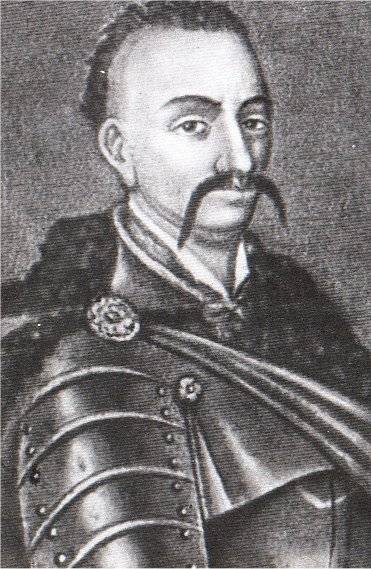
Prince Jeremiah (Yarema) Vishnevetsky (a kind of Russian prospecting). Author unknown, from the collection of the museum to them. Yana III Sobessky in Lviv
Khmelnitsky, sending detachments in different directions to support the rebels, sent one of his most talented colonels, Maxim Krivonos, against Vishnevetsky, and for some time these two opponents struggled with variable happiness. So, they collided under Makhnovka. The first to go to the Poles was with the advanced regiment Krivonosenko - the son of Krivonos, and after him Krivonos himself. The fight lasted until the evening. In the morning came the help sent by the Khmelnitsky, Belotserkovsky regiment Giri. When the Poles again went to the Cossacks, they responded so that the Poles ran. Vishnevetsky retreated under Berdichev. In pursuit of Prince Krivonos took a number of cities and fortresses, in July he took a strong fortress of Polonnoye, where there were 80 guns and large stocks of gunpowder. Also in Kyiv region, Polesie and Lithuania, colonels Krechovsky, Ganzha, Sangirey, Ostap, Golota, etc. acted more or less successfully. Many cities and castles passed into the hands of the Cossacks, thanks to the help of the Russian population.
Thus, throughout the summer of 1648, the Cossacks, in alliance with the Tatars, continued to liberate the territories of Russia from the Polish presence almost unhindered. By the end of July, the Cossacks drove the Poles out of the Left Bank, and at the end of August, having strengthened themselves, freed three right-bank voivodships: the Bratslavskoe, Kievskoye and Podolskoye. The rebels also acted north, on the territory of modern Belarus. Most of the southern and half of eastern White Russia was under their control.
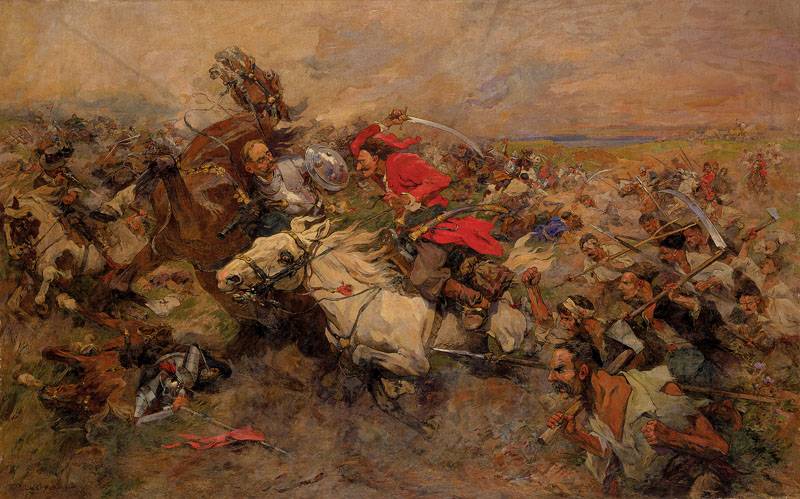
Fight of Maxim Krivonos with Jeremiah Vishnevetsky. Nikolay Samokish
Conversation. Preparing for a new fight
The envoys sent to Khmelnitsky with a letter to the king and a statement of Cossack complaints, after the death of the monarch, were to submit this letter and complaints to the senate. During the time of the royal kingdom, the head of the Polish government was usually the primate, that is, the archbishop of Gnezdinsky, who had the importance of a royal governor at that time. Primate was the aged Matvey Lubensky. The senators gathered in Warsaw for an elected Saeima were not in a hurry to respond, wanting to gain time before the election of a new king. Therefore, the Poles entered into negotiations with Khmelnitsky. 10 July in the Diet was read Khmelnitsky letter. It caused a violent reaction. Some senators demanded a decisive war against the rebels, others called for negotiations. After long disputes, they decided to hold a militia gathering and begin negotiations. For this purpose, they created a special commission headed by a famous politician and military Adam Kisel. The Cossack ambassadors were given an ultimatum: immediately release all captured Polish nobles, return captured weapons, break the alliance with the Tatars, and send the instigators of the riot to Warsaw.
Kissel immediately entered into negotiations with Bogdan, sent his messages to him and urged "the past to consign to oblivion," to come with a confession to the bosom of their "common mother of the fatherland," that is, Rzeczpospolita. Khmelnitsky was not inferior to him in the art of politics and writing humble, affectionate, but meaningless letters. In general, it was possible to agree during the negotiations not to conduct hostilities. In early August, the Polish Embassy arrived in Volyn. Kissel did not dare to go further, the region was in the grip of rebellion. However, the truce failed to comply. So, Prince Jeremiah Vishnevetsky did not pay any attention to him and continued military operations. A detachment of his troops in the eyes of Kissel attacked Ostrog, occupied by the Cossacks. The prince continued to rage, trying to drown the rebellion in blood. The Cossacks also continued their raids. Krivonos takes the city of Bar, other Cossack detachments seize Lutsk, Klevan, Olyka, etc. Shlyakhta, fleeing the rebels, threw estates and fled into the depths of Poland. And those who could not escape, were mercilessly killed.
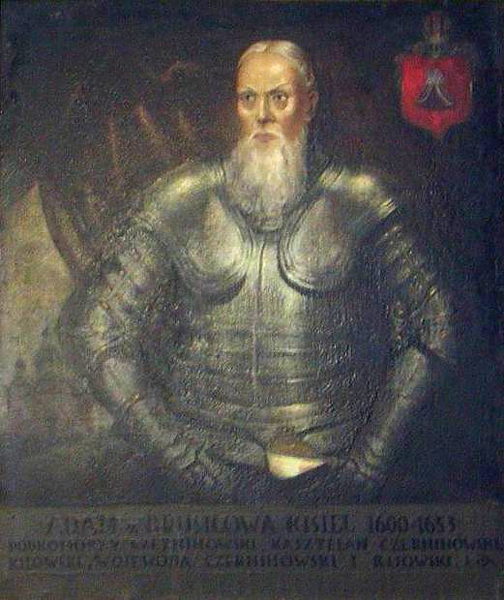
Polish grandee Adam Kissel (an ancient genus of Russian origin)
In the meantime, the Senate was taking diplomatic and military measures to suppress the popular war. The Poles sent notes to the Crimea, Constantinople, to the dignitaries of the Voloshsky and Moldavian border Moscow commanders, inclining everyone to the world or the help of the Commonwealth and blaming the traitor and the rebel Khmelnitsky. At the same time, in the Glinyany, not far from Lviv, the Poles gathered an army. Since both hetmans were in captivity, it was necessary to appoint their successors or deputies. Most of the nobility supported the Russian governor, Prince Jeremiah of Vishnevetsky, the most active, skillful and cruel commander. But the prince of his arrogant and tough, he made himself a lot of opponents among the great nobility, among them was the crown chancellor of Ossolinsky. As a result, the Senate resorted to an extraordinary measure: instead of two hetmans, he appointed three troop commanders or regimentaries (provisional commanders): the governor of Sandomierz Prince Vladislav Dominik Zaslavsky, the great Khorunzhi koronny Alexander Konetspolsky and the Marshal (chairman) of the Sejm Nikolai Ostorog. By the regimentaries, the seym was assigned an 32 adviser - “military commissars”, with unclear powers.
That is, the management was collective, and there was no strong commander among the temporary commanders. Unable to war triumvirate favored the Khmelnitsky case. No wonder those of the gentry who were serious about the war, with bitter irony, noted that these 35 commanders are enough to lose not one, but the 35 battles. This unfortunate triumvirate immediately became the subject of ridicule and wit. The Cossacks (according to some information - and Bogdan himself) gave such members nicknames: Prince Zaslavsky was called "perina" for his gentle, gentle disposition and great wealth (the pampered tycoon was known for spending most of the day in bed), Ostoroga - " Latin ”in mockery of his scholarship (he studied at three universities), in no way connected with military abilities, know how to speak Latin in abilities, and Konetspolsky - as a child because of his youth, fervent hatred for Khmelnitsky and lack of military talent. Vishnevetsky was appointed only by one of the military commissioners assigned to assist three commanders. It is clear that the proud voivode did not reconcile himself with such appointments and for some time with his army held out especially. He was joined by a part of the lords with their outdoor banners and povetovym militia; the other part is connected to the reginamentary. When both troops finally joined, a force was formed in 30 - 40 thousand soldiers, about 8 thousand German mercenaries, not counting a large number of armed convicts (each gentleman and sir was retinue of armed servants).
Triumvirate was unable to restore order in the army. The previous defeats, which occurred largely due to pride, the laxity of the Polish gentry and gentry, the underestimation of the enemy, did not teach the arrogant Poles anything. The Pansky army shone, according to the stories of contemporaries, extraordinary luxury: the gentry, hussars flaunted their expensive horses, velvet kountushi, lined with expensive furs, sabers and daggers in silver rims; on the caps the brushes sparkled with precious stones, gold chains glittered around their necks, silver and gilded spurs on their feet; chepraki were embroidered in luxurious patterns, silver stirrups. Behind the pans, as was customary, a large wagon train with countless riches went on a march: here there were luxurious clothes, silverware, honey, wine, etc. There was a whole courtyard with every pan - all kinds of servants, valets, cooks, wenches. Peers with songs and music went from morning to night. “At the sight of this army,” says the Polish historian, “one would have thought that it had gathered for the wedding.”
The gentry boasted that it would be easy to disperse the army of flakes (slaves): “It’s not worth spending bullets on such a bastard as the Cossacks,” they said, “we will scatter them with lashes!” And others loudly said: “Lord God! Do not help either us or the Cossacks, but just watch how we deal with this despicable man! ”It is clear that the simple Polish soldiers followed their commanders, they also wanted to have fun, drink, arranged drunkenness and quickly squandered their salaries. After that, they began to rob the local population along the way, setting it against Polish rule.
The Polish army from the area of Lviv moved to Starokonstantinov. Drinkers occupied Konstantinov and set up a camp here. The commanders argued: whether to remain in this convenient place for defense or to advance further. More cautious, including Vishnevetsky, advised to stay and not go to the Pilavtsy, in a very rugged and swampy area. But the others were not so careful and it was decided to go on. Coming out to the river Pilavka, the Polish army camped in a cramped and uncomfortable place. Vishnevetsky with his squad settled in a separate camp. Towards the Polish army were the regiments of Khmelnitsky, attaching to itself the troops of Krivonos, Nechay, Morozenko, Lysenko, and others. Cossack-peasant army (only about 60 - 80 thousand people) is located near the town of Pilyavtsy (Pilyava) on the bank of the river Pilyavka in a remote place, among the marshes. The Polish camp of Zaslavsky was separated from the rebels by a swampy, very swampy valley of the small river Pilavka. Opposing banks of the valley were connected by a dam, for which Khmelnitsky had sent in his hands a detachment of Cossacks who had been entrenched by trenches (trenches) on the outskirts of this dam. A detachment of Maxim Krivonos was sent to the rear of the location of the Polish army.
Bogdan called for help from the Crimean Tatars. The Ottoman Sultan hesitated between the Poles and the rebels, and restrained the Crimea from further assistance to Khmelnitsky. As a result, the Khan, having received the consent of the Sultan, again moved the horde to help the Cossacks, but she arrived after the main battle. In order to gain time, the hetman began negotiations with Zaslavsky, offering to settle all disputed issues peacefully. This led to the complete rupture of Vishnevetsky with Zaslavsky, and a serious weakening of the Polish army, which had lost the most efficient core.
Battle
There were daily skirmishes and isolated attacks. The Polish commanders, knowing that the Crimean horde had not yet arrived, were planning to strike with all their might on the fortified Cossack camp and the small Pilävetsky fortress, which they contemptuously called "kurnik." But all hesitated. But Khmelnitsky was also in no hurry to enter a decisive battle, waiting for the coming of the Tatars. Among the Poles, the former warlike sentiments evaporated. The nobles of the scarecrow, the captives told about the approach of the huge Crimean horde.
11 (21) September 1648, the Polish troops launched an offensive and knocked out the Cossacks defending the approaches to the dam. The Cossack detachment retreated, and the dam was in the hands of the Poles. Another Polish squad forced the river below the dam. The gentry were going to attack Pilyavetsky castle, where Khmelnitsky. But they did not go to the general attack. Apparently, the Poles were afraid of the arrival of the Tatar horde. In the evening of September 11, the Poles heard a wild noise from the Cossack camp: there they blew pipes, beat timpani, fired guns and cannons, and suddenly loud cries of air said: “Alla! Alla! ”This alarmed the Poles very much, and they spent the night in agonizing suspense, awaiting the attack of the Russian-Tatar army. At dawn, a Russian prisoner was captured. Under torture, he said that as if forty thousand Tatars had arrived on the eve of Khmelnytsky on the eve, and soon there would be the Khan himself with the main forces. This news was greatly exaggerated, and obviously on purpose: only the advanced Tatar detachment of several thousand sabers arrived to help the Cossacks.
Map source: Razin E. A. History military art XVI - XVII centuries. SPb., 1999
As a result, the Poles were demoralized. The chiefs quarreled. Each squad, and even each banner, entered into battle at its discretion. Some fought, others did not. The whole army had not yet managed to come out, as several of the most self-assured and impatient horse-drawn banners entered the battle. Among the swamps and bushes they could not turn around, were ambushed and were exterminated. Then the Cossacks relatively easily recaptured the previously lost positions, defeating the enemy’s infantry and overthrew the enemy. New prisoners captured by the Poles, reported that the Khan was near, and with him the troops that the grass in the field. At the same time, a significant detachment of Cossacks went to the rear of the Poles and began to disturb them greatly. In the Polish camp began to panic. Commanders quarreled, blamed for failure on each other, did not know what to do next. In the evening, at the military council, the pans decided that they should not stay longer under the Pilyavtsy, where there are many swamps and ravines, they will easily be slaughtered here. The convoy was sent back, and the command was decided to temporarily transfer to Vishnevetsky, while they themselves fled after the wagon train.
On the night of 12 on 13 (22 - 23) of September, panic spread through the army to the effect that the warlords had left the army. And Vishnevetsky was not inclined to take command in such a situation. The panic began. All the old self-confidence and arrogance evaporated. The troops, before our eyes turned into a crowd and throwing property and carts, ran after the commanders. Seeing at dawn that the Polish camp was empty, the Cossacks at first did not believe their eyes for fear of an ambush. Khmelnitsky threw troops in pursuit. The nobles fled in complete disarray, throwing weapons. Shouted: “Stand! Stand! ”- And they themselves fled, driving others to flee. General unaccountable fear turned the troops into a herd. Only Vishnevetsky was able to withdraw his detachment in a relative order. Poles fled up to the Vistula, many fled to Lviv.
From the eyewitness account of Samoyla Tvardovsky: “Oh, who could have described this night and the trouble that had been suffered! Frankly, my hand does not want to move on, to describe an unprecedented shame and the disgrace of my always knightly people. ... What a noise, what chaos prevailed there, when a lot of people, not knowing even what was the matter, jumped out of their shelters, threw their weapons ... to the ground, others, just jumping up from their sleep, grasped what they had - who took a horse, who saber, by the bridle, by the saddle. The wounded, the sick — they all threw and entrusted life to their feet. All the good and wealth, which the Poles had here, gave everything to the possession of their flakes ... "
As a result, the Cossacks won a decisive victory with virtually no major battle. The Cossack got huge trophies: several thousand wagons with all good, eighty cannons and all kinds of valuables worth ten million Polish zlotys (according to other sources - to 7 million). Cossacks rushed to rob an abandoned camp, it saved many Poles from death and captivity. But many were killed during the persecution, others were captured in Tatar. The Polish army was destroyed and scattered. The path was opened for an advance to the west, deep into Poland. After the Poles fled, the Crimean army arrived with the Kalga-Sultan and Tugay-Bey. Khmelnitsky, together with the Tatars, launched an offensive, but on the way to Warsaw, it was necessary to take two strong fortresses: Lviv and Zamost.
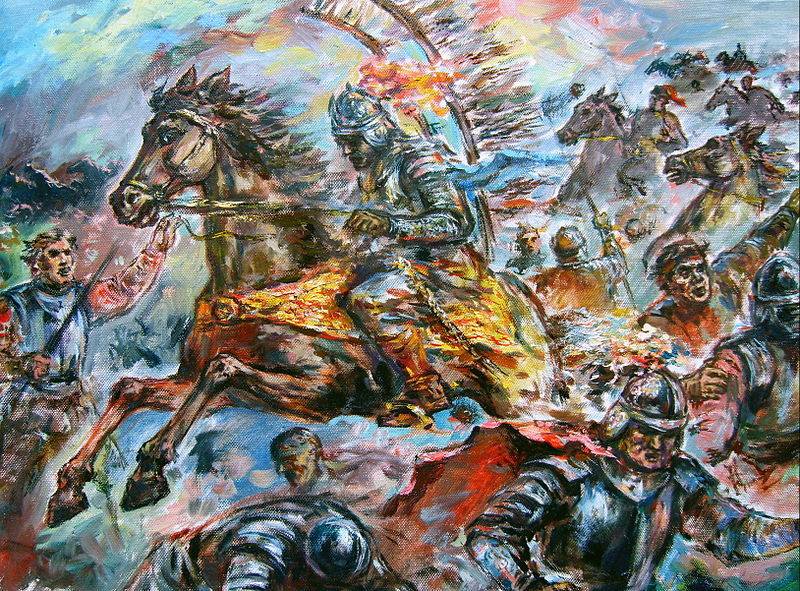
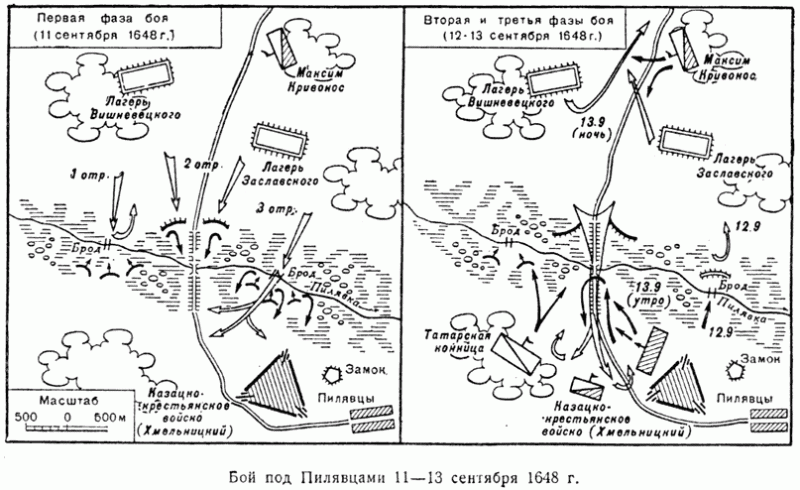
Information